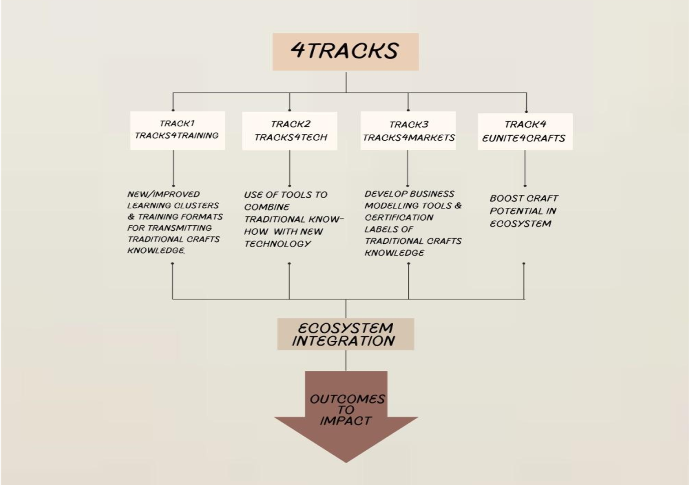Craftsmanship, a cornerstone of cultural heritage, faces the challenge of evolving in a rapidly changing world.
The Tracks4Crafts project emerges as a beacon, focusing on the transformation and transmission of Traditional Crafts Knowledge (TCK) to foster economic and societal appreciation. This initiative, coordinated by the University of Antwerp and comprising 15 partners from 10 different countries, is funded by Horizon Europe, an initiative of the European Commission.
The primary objective of Tracks4Crafts (T4C) is to elevate the transmission of traditional crafts knowledge, recognizing its potential contribution to economic growth, innovation, and sustainable development. By blending traditional craft techniques with cutting-edge technologies, the project aims to open new dimensions and opportunities for the preservation, restoration, and distribution of cultural goods, while also contributing to ecological sustainability through practices such as short-circuit exchange, re-use, and the use of renewable raw materials, fostering inclusivity in the labor market.
The project operates on four distinct tracks, each addressing crucial aspects of the traditional crafts landscape:
1.Transforming Learning Spaces: In collaboration with craftspeople, Tracks4Crafts transforms learning processes within physical spaces. These spaces include high-tech environments, fablabs, and maker spaces. By fostering collaboration, the project aims to enhance traditional craft learning experiences and overcome barriers related to the lengthy nature of learning and the fear of crafts being lost.
2. Developing Digital Technologies: A key focus of T4C is the development of new digital technologies that enhance the transmission of TCK. By embracing digital tools, the project aims to tap into the full potential of technology for turning embodied TCK into open-source knowledge, ensuring its accessibility and longevity.
3. Producing Tools and Instruments: Tracks4Crafts aims to produce tools and instruments that capture and optimize the value of TCK. This includes business modeling, certification, and property protection mechanisms. By providing these resources, the project aims to bridge economic and cultural barriers related to traditional TCK transmission.
4.Creating Networks: To foster and disseminate the societal and economic value of TCK, Tracks4Crafts establishes networks such as the CHARTER-alliance. These networks play a crucial role in sharing knowledge, experiences, and best practices, ensuring that the solutions developed are transferable and widely adopted.

To ensure the success of its objectives, Tracks4Crafts employs an interdisciplinary and multi-stakeholder co-creation approach. This involves action research and collaboration with various partners, including research institutes, heritage organizations, and umbrella organizations. By bringing together diverse perspectives, the project aims to create solutions that harmonize heritage perspectives with economic and societal needs.
Tracks4Crafts stands at the intersection of tradition and innovation, seeking to enrich our understanding of the past, present, and future through the preservation of traditional crafts knowledge. By addressing economic, cultural, and technological challenges, the project paves the way for a sustainable and inclusive future for craftsmanship in Europe. Through experimentation, collaboration, and the development of tangible tools, Tracks4Crafts endeavors to safeguard not only crafts but also the intangible skills and knowledge that define our cultural heritage.